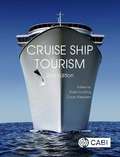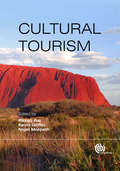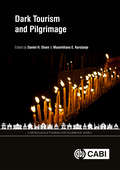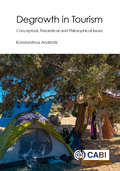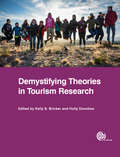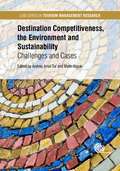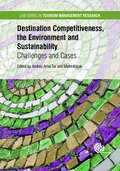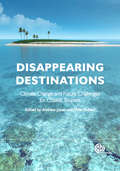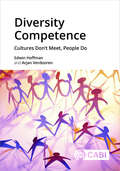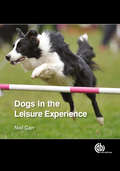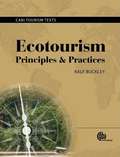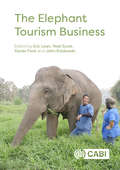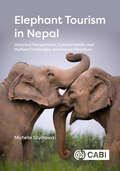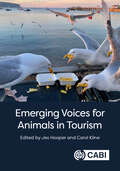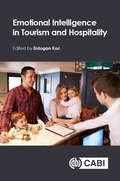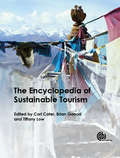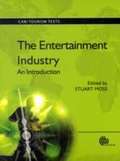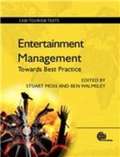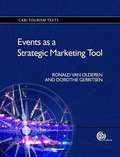- Table View
- List View
Cruise Ship Tourism
by Professor Michael Clancy Professor Ross A Klein Dr William Terry Professor Xavier Font Dr Mireia Guix Navarrete Dr Maria Jesús Bonilla Dr Michael Lück Dr Jill Poulston Michael P. Vogel Dr Adam Weaver Alexis Papathanassis Dr Philip Gibson Dr Maree Thyne James Henry Jo-Anne Lester Dr Júlio Mendes Dr Manuela Guerreiro Bingjie Liu Dr Lori Pennington-Gray Dr Peter Tarlow Dr Arja Lemmetyinen Dr Gabriella Polizzi Dr Antonino Mario Oliveri Dr Sheree-Ann Adams Professor James Petrick Suiwen Zou Dr Kam Hung Dr Claire Lambert Ross Dowling Dr Nigel Jarvis Clare Weeden Dr Ioannis Pantelidis Dr Abel Alonso Nevil Alexander Dr Eloise Botelho Carla Fraga Rodrigo Vilani Dr Michael Shone Dr Jude Wilson Dr David G Simmons Dr Emma J Stewart Dr Joseph M Cheer Dr Gaetano Sabato C Michael Hall Hannah Wood Sandra Wilson Dr Claire Ellis Dr Pascal Scherrer Kaye Walker Dr Daniela Liggett Emad Monshi Professor Noel Scott Dr Marianna Sigala Dr Véronique Mondou Benjamin Taunay Dr Iris MaoCompletely updated and revised, Cruise Ship Tourism, 2nd Edition covers the economic, social and environmental impacts of cruising, combining the latest knowledge and research to provide a comprehensive account of the subject. Despite the industry growing rapidly, there is a substantial gap in the related literature, and this book addresses the key issues for researchers, students and industry professionals. This second edition: - Reviews the fundamental principles of the industry, the cruise experience from a passenger perspective, marketing, planning and destination development. - Includes case studies throughout, translating theory into practical management advice. - Comprises contributions from over fifty international contributors to portray a truly global perspective. - Provides numerous full colour illustrations to bring the subject to life. A valuable 'one-stop-shop' for those interested in cruise ships and maritime tourism, this new edition from major names in the field is also an invaluable resource for anyone concerned more widely with tourism and business development.
Cultural Tourism
by Jane Legget Jon Edwards Claudia Kroesbacher Tahir Rashid Ian Rotherham Kevin Griffin Frances Mcgettigan Vincent Zamitt Alexandra Tirca Wided Majdoub Kelli Ann Malone Ivana Pavlic Razaq Raj Dr Dolors Vidal Manon Niesten Carlos Fernandes Anna Thompson Lia Bassa Nigel Morpeth Catherine Gorman Neus Crous-CostaWith contributions from international experts this book provides a broad discussion of cultural tourism as a concept and the way it is implemented in diverse regions around the world. Addressing the notion of cultural tourism and what it means to tourism as an industry, and also types of cultural tourism offered to tourists and experienced by them. Many international case studies will be included on specific instances of cultural tourism, and current topics such as cultural tourism's relationship to sustainability are discussed.
Cultural Tourism
by Jon Edwards Carlos Fernandes Wided Majdoub Claudia Kroesbacher Ian Rotherham Tahir Rashid Catherine Gorman Frances McGettigan Vincent Zamitt Manon Niesten Lia Bassa Kelli Ann Malone Ivana Pavlic Jane Legget Anna Thompson Dr Dolors Vidal-Casellas Alexandra Tirca Neus Crous-CostaWith contributions from international experts this book provides a broad discussion of cultural tourism as a concept and the way it is implemented in diverse regions around the world. Addressing the notion of cultural tourism and what it means to tourism as an industry, and also types of cultural tourism offered to tourists and experienced by them. Many international case studies will be included on specific instances of cultural tourism, and current topics such as cultural tourism's relationship to sustainability are discussed.
Dark Tourism and Pilgrimage (CABI Religious Tourism and Pilgrimage Series)
by Dr Nitasha Sharma Müjde Bidec Geraldine Anne Tan Luke Howie Dr Danielle Johannesen Dr Boža Grafenauer Dr Lea Kužnik Katheryn Wright Nuša Basle Nigel Bond Alissa Burger Angela Carr Donna Comtesse Janna R. Caspersen Matthew Cook Scott K. Esplin Julie Hartley-Moore Jennifer Hayes Brian J. Hill Jacie L. Jones Kathy Knox Sonja Sibila Lebe Cecelia R. Lewis Sonia Mileva Dane Munro Stephen Newton Lidija Pliberšek Jodi M. Thesing-Ritter Nicholas J. Walkowiak Peter J. Ward Yachen Zhang Alexandra Coghlan Joseph DonicaIn recent years there has been a growth in both the practice and research of dark tourism; the phenomenon of visiting sites of tragedy or disaster. Expanding on this trend, this book examines dark tourism through the new lens of pilgrimage. It focuses on dark tourism sites as pilgrimage destinations, dark tourists as pilgrims, and pilgrimage as a form of dark tourism. Taking a broad definition of pilgrimage so as to consider aspects of both religious and non-religious travel that might be considered pilgrimage-like, it covers theories and histories of dark tourism and pilgrimage, pilgrimage to dark tourism sites, and experience design. A key resource for researchers and students of heritage, tourism and pilgrimage, this book will also be of great interest to those studying anthropology, religious studies and related social science subjects.
Degrowth in Tourism: Conceptual, Theoretical And Philosophical Issues
by Konstantinos AndriotisThe modern-day world faces a hostile climate, depleted resources and the destruction of habitats. The dream that growth will lead to a materialistic utopia is left unfulfilled by a lack of ecological and economic capacity. The only choice is to find alternatives to increased growth, transform the structures and institutions currently shaping the world, change lifestyles and articulate a more credible vision for the future and lasting prosperity. As a reaction to the problems accrued by capitalism, new development approaches such as the concept of degrowth have evolved. <P><P>Degrowth in Tourism explores newly-emerging development and philosophical approaches that provide more equity for host communities and offer a low-carbon future by looking at alternatives to the classic models of development and applying the concept of degrowth in a tourism context. <P><P>Proposing that we need to shift tourism research from models which prioritize commodified tourism experiences to those that offer alternative decommodified ones, this book: <P><P>- Provides topical analysis and illustrates the key themes of degrowth; - Discusses the relationship between tourism and degrowth from both a historic perspective and through contemporary patterns of activity; - Includes international examples and case studies to translate theory into practical new approaches. <P><P>A comprehensive review of the subject, this book will be of great interest to researchers and practitioners within tourism, development, environment and economics, as well as those specifically studying degrowth.
Degrowth in Tourism: Conceptual, Theoretical and Philosophical Issues
by Dr Konstantinos AndriotisThe modern-day world faces a hostile climate, depleted resources and the destruction of habitats. The dream that growth will lead to a materialistic utopia is left unfulfilled by a lack of ecological and economic capacity. The only choice is to find alternatives to increased growth, transform the structures and institutions currently shaping the world, change lifestyles and articulate a more credible vision for the future and lasting prosperity. As a reaction to the problems accrued by capitalism, new development approaches such as the concept of degrowth have evolved. Degrowth in Tourism explores newly-emerging development and philosophical approachesthat provide more equity for host communities and offer a low-carbon future by looking at alternatives to the classic models of development and applying the concept of degrowth in a tourism context. Proposing that we need to shift tourism research from models which prioritize commodified tourism experiences to those that offer alternative decommodified ones, this book: - Provides topical analysis and illustrates the key themes of degrowth; - Discusses the relationship between tourism and degrowth from both a historic perspective and through contemporary patterns of activity; - Includes international examples and case studies to translate theory into practical new approaches. A comprehensive review of the subject, this book will be of great interest to researchers and practitioners within tourism, development, environment and economics, as well as those specifically studying degrowth.
Demystifying Theories in Tourism Research
by Holly Donohoe Kelly BrickerIt often seems that there is more confusion than consensus regarding tourism theory. Does tourism have theories it can truly own, or does it just borrow from other academic disciplines? It can be difficult to understand the theories and conceptual frameworks available, and how to apply these ideas to a research endeavour. This book reviews theoretical perspectives on tourism from planning and management, through marketing and host communities to the tourism consumers themselves. Covering issues such as tour guiding, rural tourism development and destination image, it provides a complete guide to the industry. Including pedagogical features throughout, this book is an accessible approach to a controversial subject.
Demystifying Theories in Tourism Research
by Professor Kelly Bricker Holly DonohoeIt often seems that there is more confusion than consensus regarding tourism theory. Does tourism have theories it can truly own, or does it just borrow from other academic disciplines? It can be difficult to understand the theories and conceptual frameworks available, and how to apply these ideas to a research endeavour. This book reviews theoretical perspectives on tourism from planning and management, through marketing and host communities to the tourism consumers themselves. Covering issues such as tour guiding, rural tourism development and destination image, it provides a complete guide to the industry. Including pedagogical features throughout, this book is an accessible approach to a controversial subject.
Destination Competitiveness, the Environment and Sustainability
by Andrés Artal-Tur Metin KozakDestination competitiveness and sustainability are important issues for many stakeholders within the tourism industry. In recent years, destinations have faced some challenges with respect to maintaining sustainability; they must be cleaner, greener and safer in order to safeguard the life quality of holidaymakers and local residents. Providing an invaluable review of the latests research on the topic, global case studies provide a perspective of the worldwide challenges and solutions arising in the management of tourism destinations. The analysis presents an interdisciplinary approach, including contributions of economists, geographers, managers and marketing professionals.
Destination Competitiveness, the Environment and Sustainability: Challenges and Cases (CABI Series in Tourism Management Research)
by Andrés Artal-Tur Metin KozakDestination competitiveness and sustainability are important issues for many stakeholders within the tourism industry. In recent years, destinations have faced some challenges with respect to maintaining sustainability; they must be cleaner, greener and safer in order to safeguard the life quality of holidaymakers and local residents. Providing an invaluable review of the latests research on the topic, global case studies provide a perspective of the worldwide challenges and solutions arising in the management of tourism destinations. The analysis presents an interdisciplinary approach, including contributions of economists, geographers, managers and marketing professionals.
Disappearing Destinations:
by Dr Bas Amelung Dr Giorgio Anfuso Dr Andrew L Jones Dr Michael PhillipsProviding a thorough examination of the threats posed to destinations by tourism, this comprehensive text discusses how popular and fragile destinations such as the Great Barrier Reef could become severely damaged and forced to close to tourists if current tourism trends continue. The consequences of tourism growth, predicted changes, and management and policy responses are reviewed. The book will explore tourism in the context of climate change and vulnerable environments, exploring the situation at local level and in a wider perspective using international case studies throughout and providing future recommendations. It will be an essential text for researchers, policymakers and students in tourism, ecotourism, environmental conservation, planning, coastal management and engineering, climate change and marine conservation.
Diversity Competence: Cultures Don’t Meet, People Do
by Dr Edwin Hoffman Arjan VerdoorenIn today's world many people live, learn and work in international and multicultural environments. Intercultural communication has become an important topic in many fields of work and study. Given the complexities of globalization, knowledge of cultures and cultural differences is rarely sufficient. In this book, interpersonal communication forms the point of departure: the meeting of people, not of cultures. The authors describe what diversity competence entails: which processes, challenges and skills are relevant in a 'superdiverse' world. They demonstrate how the TOPOI model offers an inclusive, communicative approach to analyzing and addressing potential miscommunication. - Addresses controversial topics frankly and clearly without being simplistic. - Discusses theory from several different fields. - Case studies provide practical examples and guidelines. - Companion website with extra case studies and study assignments. The target audience for Diversity Competence includes students, educators and professionals in the fields of communication and media, business, management and leadership, governance and international relations and cooperation.
Diversity Competence: Cultures Don’t Meet, People Do
by Dr Edwin Hoffman Arjan VerdoorenIn today's world many people live, learn and work in international and multicultural environments. Intercultural communication has become an important topic in many fields of work and study. Given the complexities of globalization, knowledge of cultures and cultural differences is rarely sufficient. In this book, interpersonal communication forms the point of departure: the meeting of people, not of cultures. The authors describe what diversity competence entails: which processes, challenges and skills are relevant in a 'superdiverse' world. They demonstrate how the TOPOI model offers an inclusive, communicative approach to analyzing and addressing potential miscommunication. - Addresses controversial topics frankly and clearly without being simplistic. - Discusses theory from several different fields. - Case studies provide practical examples and guidelines. - Companion website with extra case studies and study assignments. The target audience for Diversity Competence includes students, educators and professionals in the fields of communication and media, business, management and leadership, governance and international relations and cooperation.
Dogs in the Leisure Experience
by Neil CarrThis book explores the social and cultural constructions and debates of what are dogs and what is leisure. It looks at how working dogs play a significant role in leisure experiences such as ensuring the safety of air transport, and considers the differing roles and changing acceptance of dogs' involvement in sport. Within the setting of the animal welfare and sentience debates, it examines the leisure needs of dogs and their owners. Providing an original contribution to our understanding of dogs as both participants and objects in the leisure experience, this book is a useful resource for researchers in leisure, hospitality and tourism.
Dogs in the Leisure Experience
by Neil CarrThis book explores the social and cultural constructions and debates of what are dogs and what is leisure. It looks at how working dogs play a significant role in leisure experiences such as ensuring the safety of air transport, and considers the differing roles and changing acceptance of dogs’ involvement in sport. Within the setting of the animal welfare and sentience debates, it examines the leisure needs of dogs and their owners. Providing an original contribution to our understanding of dogs as both participants and objects in the leisure experience, this book is a useful resource for researchers in leisure, hospitality and tourism.
Ecotourism
by Ralf BuckleyEcotourism is a useful concept, but not a very well defined one; it has been debated in theory and attempted in practice for nearly two decades. Its key goal is to reduce the net environmental impact of the tourism industry, via mechanisms including minimal impact management measures, education, community involvement, private conservation, contributions to public protected areas, expansion of ecotourism enterprises and mainstreaming of ecotourism principles. Focussing on fundamental ecotourism concepts, this broad-based textbook provides a basis for studies into environment-based tourism. It covers key topics such as the management, economics and potential environmental impacts both positive and negative of this popular and growing sector. Written for tourism students and an ideal resource for undergraduate courses, Ecotourism: Principles and Practices will also interest industry practitioners and researchers. Now you can access additional content items for this textbook. You can download pdfs of powerpoint slides as study aids and to assist in teaching the subject matter. This content is free to own and is available from Griffith University here
The Elephant Tourism Business
by Ann Suwaree Ashton Liv Baker Sumanth Bindumadhav Sarah Blaine Eric Brymer Naphawan Chantradoan Saranphat Chotmanakul Qingming Cui Susanna Curtin Charlotte Day Nilakshi Galahitiyawe Vivek Gurusamy Professor Xavier Font Nicole Hausler Jeffrey Dale Hobbs Claire Jenkinson Professor John Koldowski Naut Kusters Eric Laws Shilpa Mahbubani Andrew McLean Mucha Mkono Somyot Ongkhluap Anja Pabel Piengpen Na Pattalung Clive Phillips Kannapa Pongponrat Bongkosh Rittichainuwat John Edward Roberts Andrea Saayman Melville Saayman Jan Schmidt-Burbach Professor Noel Scott Alokparna Sengupta Vinathe Sharma-Brymer Ramona Strödecke Daminda Sumanapala Daniel Turner Marjorie Van Strein Rebecca Winkler Isabelle Wolf Honggang XuElephant tourism is a growing activity in many countries across Asia and Africa and is popular with tourists from all parts of the world. Elephant tourism has grown rapidly, providing the only viable way for elephants and their owners to survive since the banning of logging. Old logging camps have been developed into sanctuaries for some elephants, but many other camps were established as entertainment centres, resulting in serious welfare issues for the elephants and their mahouts. The profits from elephant tourism in Asia have encouraged African operators to follow a similar business model. This book draws attention to the need for a comprehensive and rigorous focus on local solutions to improve the welfare of captive elephants, their mahouts and local residents, and to enhance tourists' experiences of elephant tourism. It achieves this by: - Critically reviewing recent research into elephant tourism. - Providing contemporary analytical case studies of elephant tourism policy and practice. The Elephant Tourism Business will contribute to a better understanding of how elephant tourism is organised, regulated and promoted, both in elephant areas and tourist origin countries. It identifies priorities for future research into elephant tourism and provides a unique, authoritative resource for researchers, elephant managers and administrators, and tourism managers. The book will be of interest to academics and practitioners with backgrounds in conservation, the environment, tourism and veterinary sciences, and will appeal to tourists keen to experience elephants in person.
Elephant Tourism in Nepal: Historical Perspectives, Current Health and Welfare Challenges, and Future Directions
by Dr Michelle SzydlowskiA study of elephant tourism in Nepal from its origins in the 1960s to the present day, this book examines the challenges faced by captive elephants. Used as human conveyance, on anti-poaching patrol teams, as rescue vehicles, and in forestry service, elephants have worked with and for humans for hundreds of years. However, the use of elephants in tourism is a fairly new development within Nepal. Because the health and welfare of tourism elephants is vital to the conservation of wild individuals, this book offers an assessment of captive elephant needs and an examination of their existing welfare statuses. Numerous NGOS and INGOs are now active in elephant lives, and numerous advocacy organizations have arisen with the goal of changing tourism practices and improving captive elephant welfare. This book seeks to examine the motivations of these NGOs and INGOs, and to consider their ethical approaches to elephant health and welfare. Are the motivations of these organizations similar enough to work together towards a common goal, or are their ethical norms so different that they get in one another's way? Using an ordinary language and ethics framework, this text aims to identify the norms of cultures and organisations and reframe them in ways which may allow for more successful interactions.
Emerging Voices for Animals in Tourism
by Edited by Jes Hooper and Carol KlineWhile the study of animal-human interactions within the context of tourism has been explored in a greater number and diversity of ways within the last decade, the discourse remains divided between traditional tourism academia and outside disciplines 'looking in'. Tourism academia has borrowed philosophical, ethical, gender studies, sociological, ecological conservation, and economic lenses to explore animals in tourism, however collaboration with authors external to tourism studies remains few. This edited volume strengthens the bridge between tourism academia and other disciplines by highlighting the fresh perspectives, emerging methodologies and innovative interdisciplinary conventions at the forefront of animals in tourism research, whilst critically working towards more ethical human-animal interactions within the tourism and leisure space. Split into four parts 'emerging motivations', 'emerging cultures', 'emerging narratives', and 'emerging reflections', this book offers readers a rich text grounded in progressive scholarly praxis including: * Research focussed on a wide range of animal taxa, geographic locations, and touristic contexts to help move the conversation toward multi-faceted solutions. * An eclectic selection of methodological approaches from multispecies ethnography to storytelling, literary and media analyses and participant survey that showcases the emerging interdisciplinary practices. * Representation of emerging voices from various fields and disciplines around the world. This unique text will be widely applicable to scholars working towards equitable human-animal interactions within tourism.
Emotional Intelligence in Tourism and Hospitality
by Erdogan KocEmotional intelligence is the capability to recognize, use and manage one's own emotions and those of others. The use of emotional information guides thinking and behaviour, allowing adjustment of emotions to adapt to environments. As tourism and hospitality services are produced and consumed simultaneously, with a high level of contact between employees and customers, the development of emotional intelligence of employees in tourism and hospitality establishments is vital. This book has a skills-based approach and explains how emotional intelligence can be developed in tourism and hospitality students and employees. Key features: A foreword by Gill Hasson The first tourism and hospitality book to describe emotional intelligence Covers all major literature, concepts, theories and research findings from the perspective of emotional intelligence. Includes exercises, end of chapter questions, practical examples, student aids and Powerpoint slides for each chapter that can be used in class by academicians and practitioners in their training sessions. The book is intended for use by tourism and hospitality students, researchers and practitioners.
Emotional Intelligence in Tourism and Hospitality
by Erdogan KocEmotional intelligence (EI) is the ability to recognize emotions, thereby guiding behavior and allowing emotional adjustment to environments. As services are produced and consumed simultaneously, the employee EI is vital. This book uses a skills-based approach to explain how emotional intelligence can be developed in tourism and hospitality.
The Encyclopedia of Sustainable Tourism
by Tiffany Low Carl Cater Brian GarrodTourism is the world's fastest growing industry, and impacts globally upon ecology, economies, peoples, cultures and the built environment. Development, therefore, must be sustainable and sympathetic in order to preserve the environment and culture it exploits. Despite sustainable tourism being an area of considerable recent interest, there has been no synthesis of the diverse considerations of sustainable tourism, and the language and terms particular to this subject. An important resource for researchers of tourism, this reference work defines and explains terms associated with considering and preserving the environment, host peoples, communities, cultures, customs, lifestyles and social and economic systems.
Entertainment Industry
by Rebekka Kill Marc Etches Nicola Mccullough Laura Taylor Ben Walmsley Alexandra Kenyon Stuart Moss Volker Rundshagen Penelope Griffiths Stephen Henderson Nigel Morpeth Phil Clements Erika Pearson James RobertsEntertainment studies are an important emerging subject in tourism, and this introductory textbook provides a detailed overview of the entertainment industry discipline in order to prepare students for roles such as promoters, festival managers and technical support workers. Covering key aspects of entertainment by profiling individual sectors, each chapter is written by an expert working in the field and covers the history and background, products and segmentation, contemporary issues, micro and macro business, environmental influences, detailed case studies and future directions of that sector. It will be an essential text for undergraduate students in entertainment management, events management and related tourism subjects.
Entertainment Management
by Stuart Moss Ben WalmsleyFollowing on from The Entertainment Industry: An Introduction, Entertainment Management takes the next step in the development of entertainment as a practice and as an academic subject. Aimed at higher level undergraduates, the book discusses best practices in the entertainment industry, profiling a different discipline per chapter, each one a branch of entertainment that offers employment opportunities within the sector. Fields include marketing, P.R., the media, live events, artist management, arts and culture, consultancy and visitor attractions. The book aims to reflect the knowledge students will need for real world of entertainment management such as technical standards, business management, people management, economic aspects and legal issues. Each chapter discusses the background of the discipline, best practice management principles, issues in the wider environment, case studies of real organisations and future trends.
Events as a Strategic Marketing Tool
by Dorothe Gerritsen Ronald Van OlderenExperiences, encounters and events have come to play an ever-growing role in marketing as their impact is more fully understood. As a profession, however, event marketing is still a relatively new field, with most available literature covering practical project management rather than the strategy behind including events in a marketing campaign. Addressing this gap, Events as a Strategic Marketing Tool reviews the way organizations utilize events to connect with their visitors. It covers the development of the experience economy, the step from strategy to concept, event design and touchpoints. Written in an accessible style, it also considers the areas of marketing within which experiences play a role, such as branding, relationship marketing and city marketing. Concluding with a chapter on effect measurement and evaluation, Events as a Strategic Marketing Tool provides an engaging resource for both students and professionals interested in leisure, tourism and events. Including a wealth of internationally relevant examples, it gives a thorough insight into the way events can help reach strategic marketing goals.
